HEA 4303 Book Review: Ethics in Healthcare - Henrietta Lacks
VerifiedAdded on 2022/08/12
|6
|1532
|19
Report
AI Summary
This report is a book review of 'The Immortal Life of Henrietta Lacks,' examining the ethical issues surrounding the use of Henrietta Lacks' HeLa cells in medical research. The review begins with an overview of the book's primary themes, introducing Henrietta Lacks, her cancer, and the development of the HeLa cell line. The report then delves into the ethical concerns related to the removal of Henrietta's cells for research, focusing on the violation of informed consent, privacy rights, and the principles of honesty and justice. The analysis incorporates ethical theories, such as virtue ethics and Kant's moral theories, to evaluate the actions of the doctors and researchers. Finally, the report acknowledges the significant benefits HeLa cells have provided to medical science while emphasizing that the ends do not justify the means when the means involve unethical practices, particularly the lack of informed consent. The review highlights the importance of ethical guidelines and policies in modern medical research, ensuring patient rights and privacy are protected.
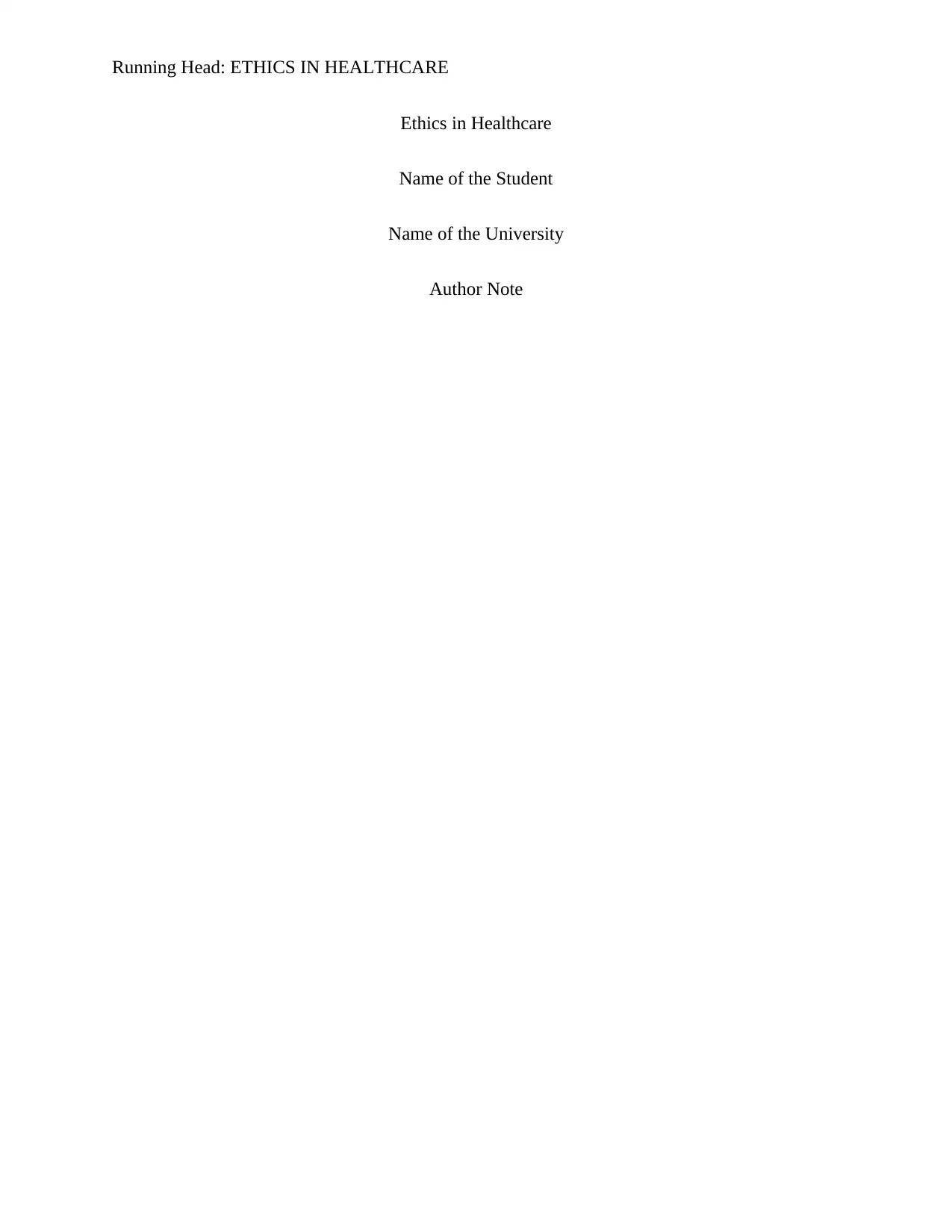
Running Head: ETHICS IN HEALTHCARE
Ethics in Healthcare
Name of the Student
Name of the University
Author Note
Ethics in Healthcare
Name of the Student
Name of the University
Author Note
Paraphrase This Document
Need a fresh take? Get an instant paraphrase of this document with our AI Paraphraser
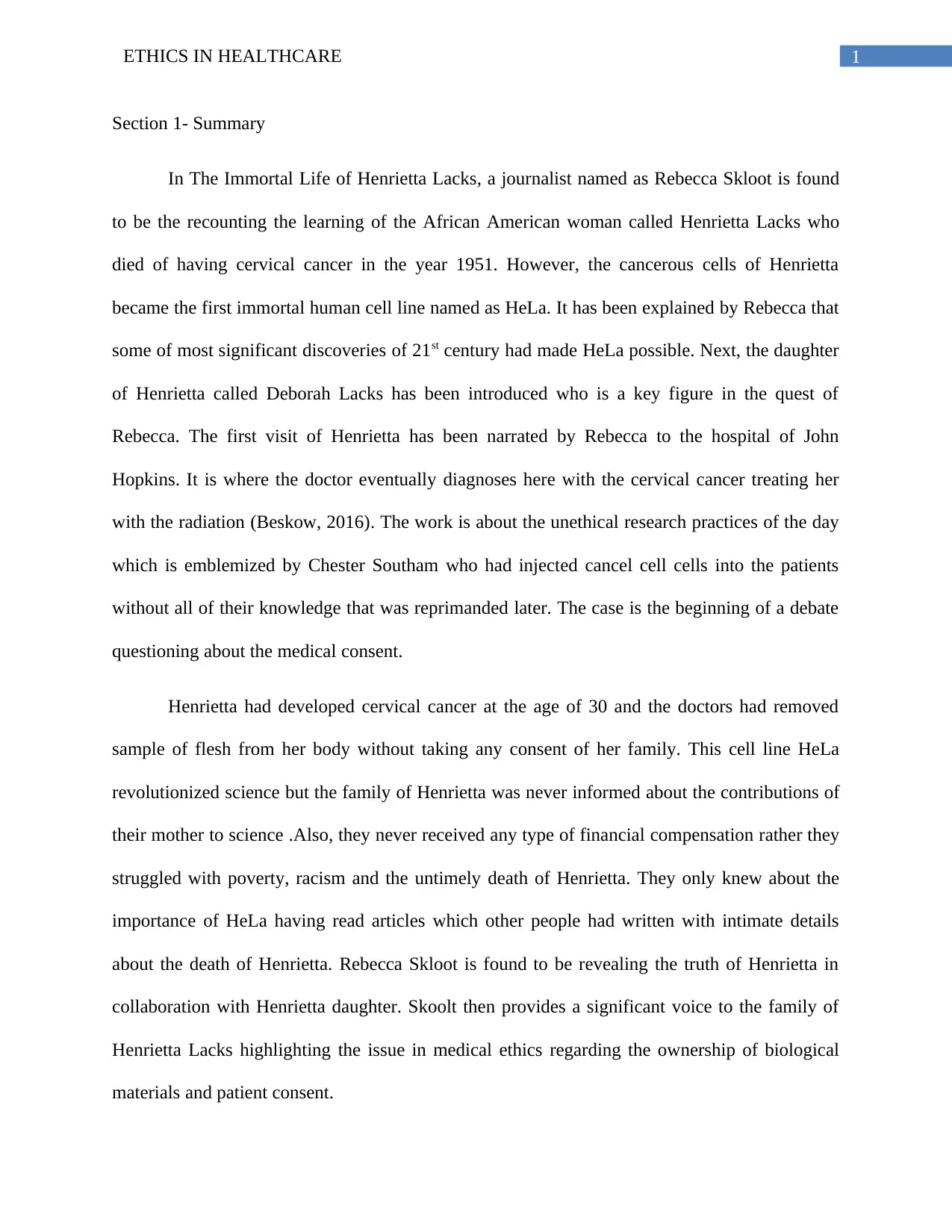
1ETHICS IN HEALTHCARE
Section 1- Summary
In The Immortal Life of Henrietta Lacks, a journalist named as Rebecca Skloot is found
to be the recounting the learning of the African American woman called Henrietta Lacks who
died of having cervical cancer in the year 1951. However, the cancerous cells of Henrietta
became the first immortal human cell line named as HeLa. It has been explained by Rebecca that
some of most significant discoveries of 21st century had made HeLa possible. Next, the daughter
of Henrietta called Deborah Lacks has been introduced who is a key figure in the quest of
Rebecca. The first visit of Henrietta has been narrated by Rebecca to the hospital of John
Hopkins. It is where the doctor eventually diagnoses here with the cervical cancer treating her
with the radiation (Beskow, 2016). The work is about the unethical research practices of the day
which is emblemized by Chester Southam who had injected cancel cell cells into the patients
without all of their knowledge that was reprimanded later. The case is the beginning of a debate
questioning about the medical consent.
Henrietta had developed cervical cancer at the age of 30 and the doctors had removed
sample of flesh from her body without taking any consent of her family. This cell line HeLa
revolutionized science but the family of Henrietta was never informed about the contributions of
their mother to science .Also, they never received any type of financial compensation rather they
struggled with poverty, racism and the untimely death of Henrietta. They only knew about the
importance of HeLa having read articles which other people had written with intimate details
about the death of Henrietta. Rebecca Skloot is found to be revealing the truth of Henrietta in
collaboration with Henrietta daughter. Skoolt then provides a significant voice to the family of
Henrietta Lacks highlighting the issue in medical ethics regarding the ownership of biological
materials and patient consent.
Section 1- Summary
In The Immortal Life of Henrietta Lacks, a journalist named as Rebecca Skloot is found
to be the recounting the learning of the African American woman called Henrietta Lacks who
died of having cervical cancer in the year 1951. However, the cancerous cells of Henrietta
became the first immortal human cell line named as HeLa. It has been explained by Rebecca that
some of most significant discoveries of 21st century had made HeLa possible. Next, the daughter
of Henrietta called Deborah Lacks has been introduced who is a key figure in the quest of
Rebecca. The first visit of Henrietta has been narrated by Rebecca to the hospital of John
Hopkins. It is where the doctor eventually diagnoses here with the cervical cancer treating her
with the radiation (Beskow, 2016). The work is about the unethical research practices of the day
which is emblemized by Chester Southam who had injected cancel cell cells into the patients
without all of their knowledge that was reprimanded later. The case is the beginning of a debate
questioning about the medical consent.
Henrietta had developed cervical cancer at the age of 30 and the doctors had removed
sample of flesh from her body without taking any consent of her family. This cell line HeLa
revolutionized science but the family of Henrietta was never informed about the contributions of
their mother to science .Also, they never received any type of financial compensation rather they
struggled with poverty, racism and the untimely death of Henrietta. They only knew about the
importance of HeLa having read articles which other people had written with intimate details
about the death of Henrietta. Rebecca Skloot is found to be revealing the truth of Henrietta in
collaboration with Henrietta daughter. Skoolt then provides a significant voice to the family of
Henrietta Lacks highlighting the issue in medical ethics regarding the ownership of biological
materials and patient consent.
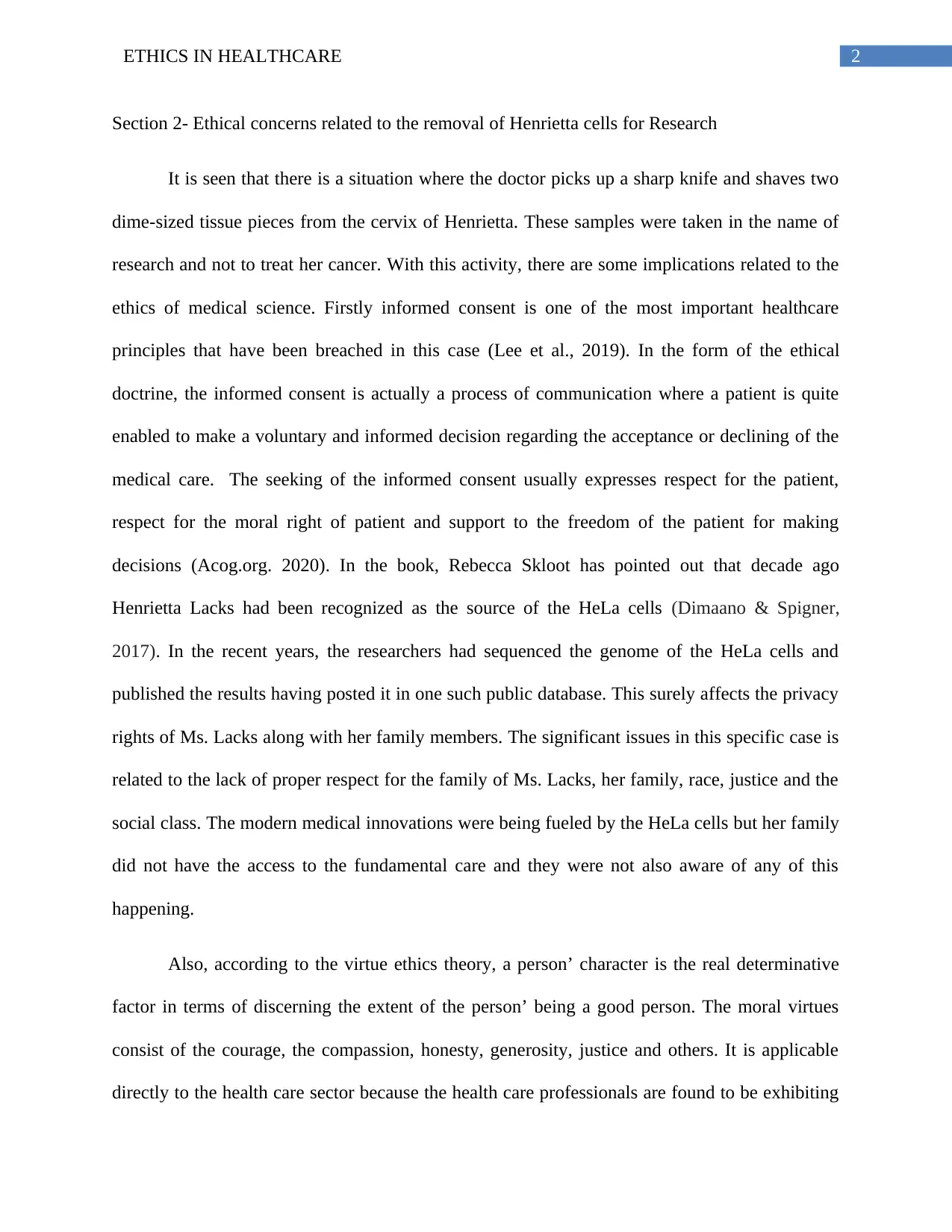
2ETHICS IN HEALTHCARE
Section 2- Ethical concerns related to the removal of Henrietta cells for Research
It is seen that there is a situation where the doctor picks up a sharp knife and shaves two
dime-sized tissue pieces from the cervix of Henrietta. These samples were taken in the name of
research and not to treat her cancer. With this activity, there are some implications related to the
ethics of medical science. Firstly informed consent is one of the most important healthcare
principles that have been breached in this case (Lee et al., 2019). In the form of the ethical
doctrine, the informed consent is actually a process of communication where a patient is quite
enabled to make a voluntary and informed decision regarding the acceptance or declining of the
medical care. The seeking of the informed consent usually expresses respect for the patient,
respect for the moral right of patient and support to the freedom of the patient for making
decisions (Acog.org. 2020). In the book, Rebecca Skloot has pointed out that decade ago
Henrietta Lacks had been recognized as the source of the HeLa cells (Dimaano & Spigner,
2017). In the recent years, the researchers had sequenced the genome of the HeLa cells and
published the results having posted it in one such public database. This surely affects the privacy
rights of Ms. Lacks along with her family members. The significant issues in this specific case is
related to the lack of proper respect for the family of Ms. Lacks, her family, race, justice and the
social class. The modern medical innovations were being fueled by the HeLa cells but her family
did not have the access to the fundamental care and they were not also aware of any of this
happening.
Also, according to the virtue ethics theory, a person’ character is the real determinative
factor in terms of discerning the extent of the person’ being a good person. The moral virtues
consist of the courage, the compassion, honesty, generosity, justice and others. It is applicable
directly to the health care sector because the health care professionals are found to be exhibiting
Section 2- Ethical concerns related to the removal of Henrietta cells for Research
It is seen that there is a situation where the doctor picks up a sharp knife and shaves two
dime-sized tissue pieces from the cervix of Henrietta. These samples were taken in the name of
research and not to treat her cancer. With this activity, there are some implications related to the
ethics of medical science. Firstly informed consent is one of the most important healthcare
principles that have been breached in this case (Lee et al., 2019). In the form of the ethical
doctrine, the informed consent is actually a process of communication where a patient is quite
enabled to make a voluntary and informed decision regarding the acceptance or declining of the
medical care. The seeking of the informed consent usually expresses respect for the patient,
respect for the moral right of patient and support to the freedom of the patient for making
decisions (Acog.org. 2020). In the book, Rebecca Skloot has pointed out that decade ago
Henrietta Lacks had been recognized as the source of the HeLa cells (Dimaano & Spigner,
2017). In the recent years, the researchers had sequenced the genome of the HeLa cells and
published the results having posted it in one such public database. This surely affects the privacy
rights of Ms. Lacks along with her family members. The significant issues in this specific case is
related to the lack of proper respect for the family of Ms. Lacks, her family, race, justice and the
social class. The modern medical innovations were being fueled by the HeLa cells but her family
did not have the access to the fundamental care and they were not also aware of any of this
happening.
Also, according to the virtue ethics theory, a person’ character is the real determinative
factor in terms of discerning the extent of the person’ being a good person. The moral virtues
consist of the courage, the compassion, honesty, generosity, justice and others. It is applicable
directly to the health care sector because the health care professionals are found to be exhibiting
⊘ This is a preview!⊘
Do you want full access?
Subscribe today to unlock all pages.

Trusted by 1+ million students worldwide
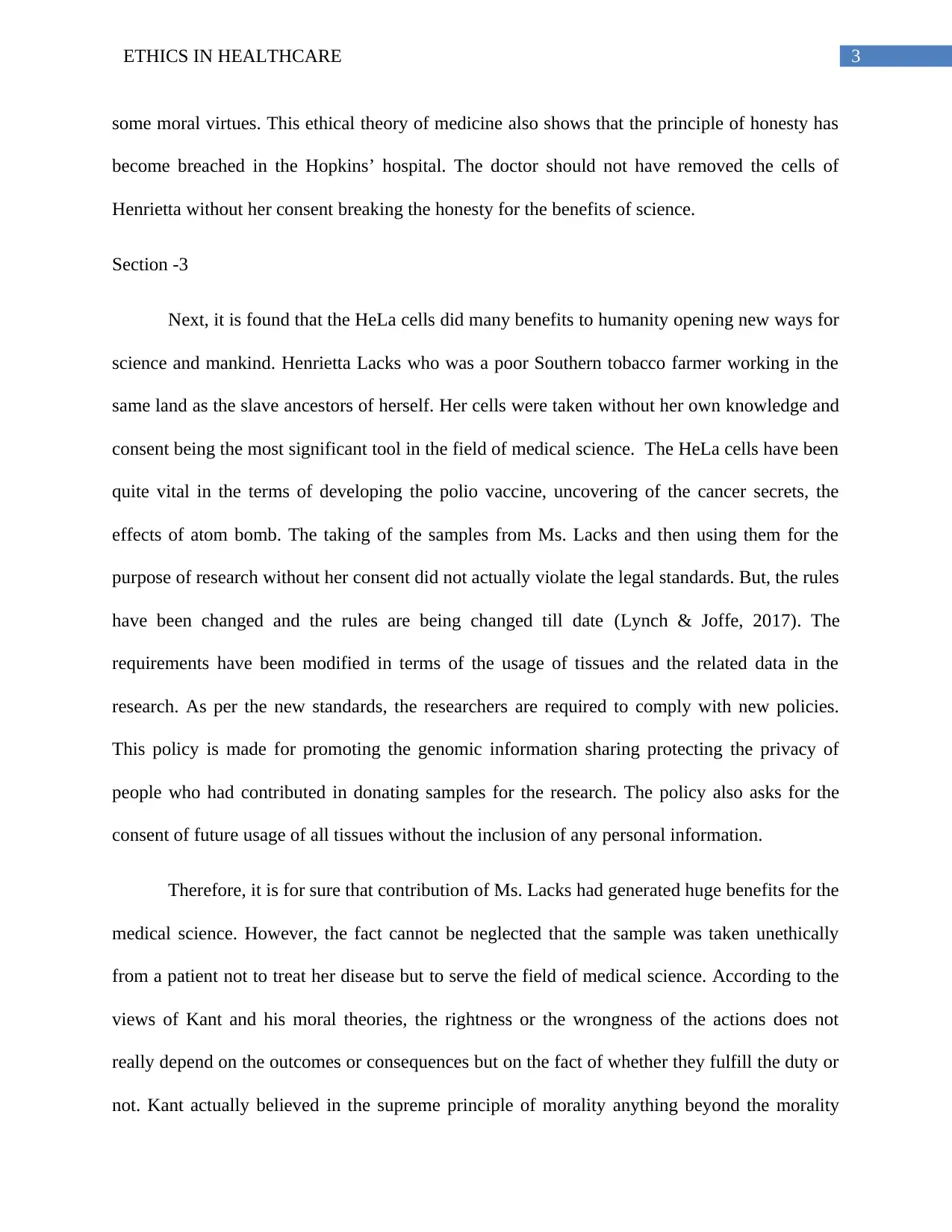
3ETHICS IN HEALTHCARE
some moral virtues. This ethical theory of medicine also shows that the principle of honesty has
become breached in the Hopkins’ hospital. The doctor should not have removed the cells of
Henrietta without her consent breaking the honesty for the benefits of science.
Section -3
Next, it is found that the HeLa cells did many benefits to humanity opening new ways for
science and mankind. Henrietta Lacks who was a poor Southern tobacco farmer working in the
same land as the slave ancestors of herself. Her cells were taken without her own knowledge and
consent being the most significant tool in the field of medical science. The HeLa cells have been
quite vital in the terms of developing the polio vaccine, uncovering of the cancer secrets, the
effects of atom bomb. The taking of the samples from Ms. Lacks and then using them for the
purpose of research without her consent did not actually violate the legal standards. But, the rules
have been changed and the rules are being changed till date (Lynch & Joffe, 2017). The
requirements have been modified in terms of the usage of tissues and the related data in the
research. As per the new standards, the researchers are required to comply with new policies.
This policy is made for promoting the genomic information sharing protecting the privacy of
people who had contributed in donating samples for the research. The policy also asks for the
consent of future usage of all tissues without the inclusion of any personal information.
Therefore, it is for sure that contribution of Ms. Lacks had generated huge benefits for the
medical science. However, the fact cannot be neglected that the sample was taken unethically
from a patient not to treat her disease but to serve the field of medical science. According to the
views of Kant and his moral theories, the rightness or the wrongness of the actions does not
really depend on the outcomes or consequences but on the fact of whether they fulfill the duty or
not. Kant actually believed in the supreme principle of morality anything beyond the morality
some moral virtues. This ethical theory of medicine also shows that the principle of honesty has
become breached in the Hopkins’ hospital. The doctor should not have removed the cells of
Henrietta without her consent breaking the honesty for the benefits of science.
Section -3
Next, it is found that the HeLa cells did many benefits to humanity opening new ways for
science and mankind. Henrietta Lacks who was a poor Southern tobacco farmer working in the
same land as the slave ancestors of herself. Her cells were taken without her own knowledge and
consent being the most significant tool in the field of medical science. The HeLa cells have been
quite vital in the terms of developing the polio vaccine, uncovering of the cancer secrets, the
effects of atom bomb. The taking of the samples from Ms. Lacks and then using them for the
purpose of research without her consent did not actually violate the legal standards. But, the rules
have been changed and the rules are being changed till date (Lynch & Joffe, 2017). The
requirements have been modified in terms of the usage of tissues and the related data in the
research. As per the new standards, the researchers are required to comply with new policies.
This policy is made for promoting the genomic information sharing protecting the privacy of
people who had contributed in donating samples for the research. The policy also asks for the
consent of future usage of all tissues without the inclusion of any personal information.
Therefore, it is for sure that contribution of Ms. Lacks had generated huge benefits for the
medical science. However, the fact cannot be neglected that the sample was taken unethically
from a patient not to treat her disease but to serve the field of medical science. According to the
views of Kant and his moral theories, the rightness or the wrongness of the actions does not
really depend on the outcomes or consequences but on the fact of whether they fulfill the duty or
not. Kant actually believed in the supreme principle of morality anything beyond the morality
Paraphrase This Document
Need a fresh take? Get an instant paraphrase of this document with our AI Paraphraser
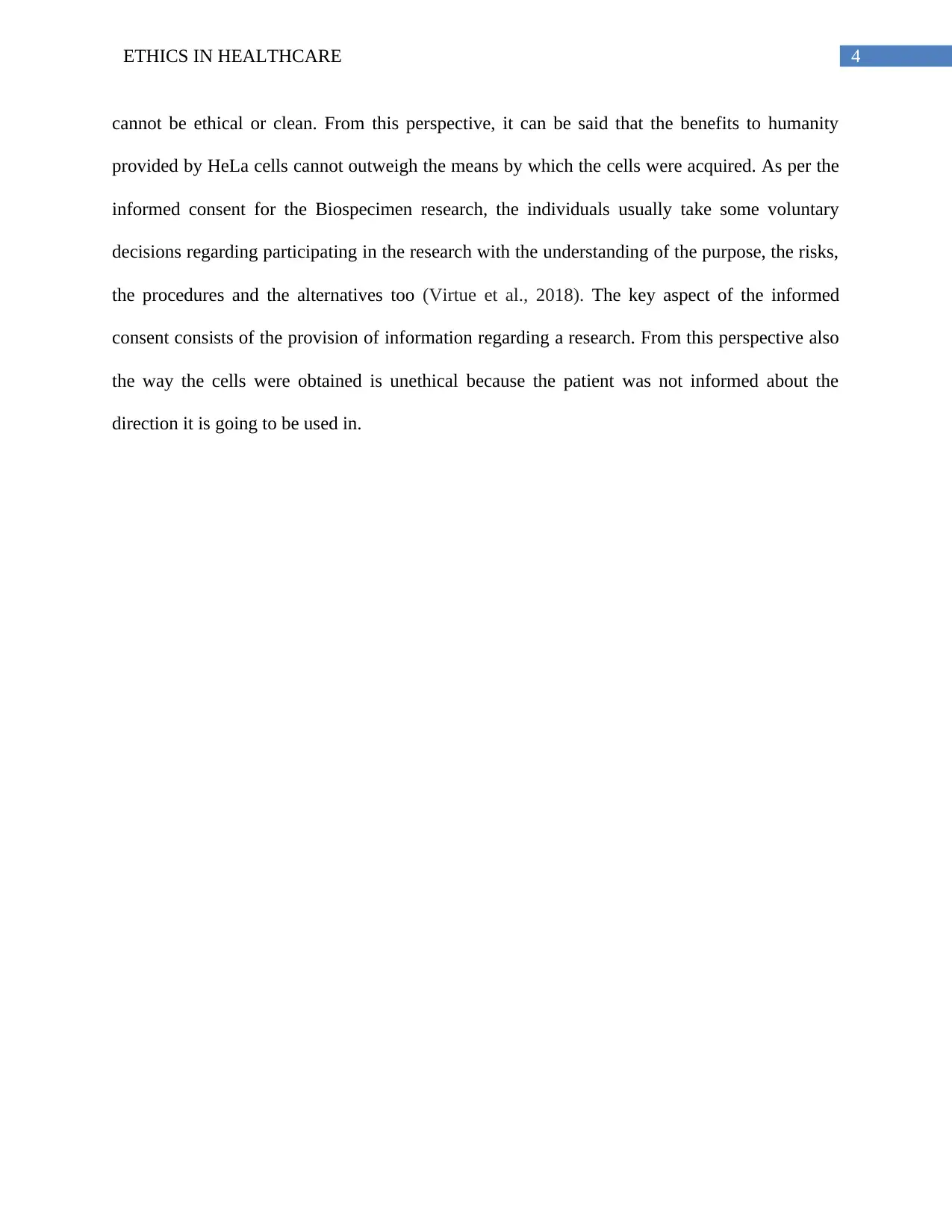
4ETHICS IN HEALTHCARE
cannot be ethical or clean. From this perspective, it can be said that the benefits to humanity
provided by HeLa cells cannot outweigh the means by which the cells were acquired. As per the
informed consent for the Biospecimen research, the individuals usually take some voluntary
decisions regarding participating in the research with the understanding of the purpose, the risks,
the procedures and the alternatives too (Virtue et al., 2018). The key aspect of the informed
consent consists of the provision of information regarding a research. From this perspective also
the way the cells were obtained is unethical because the patient was not informed about the
direction it is going to be used in.
cannot be ethical or clean. From this perspective, it can be said that the benefits to humanity
provided by HeLa cells cannot outweigh the means by which the cells were acquired. As per the
informed consent for the Biospecimen research, the individuals usually take some voluntary
decisions regarding participating in the research with the understanding of the purpose, the risks,
the procedures and the alternatives too (Virtue et al., 2018). The key aspect of the informed
consent consists of the provision of information regarding a research. From this perspective also
the way the cells were obtained is unethical because the patient was not informed about the
direction it is going to be used in.
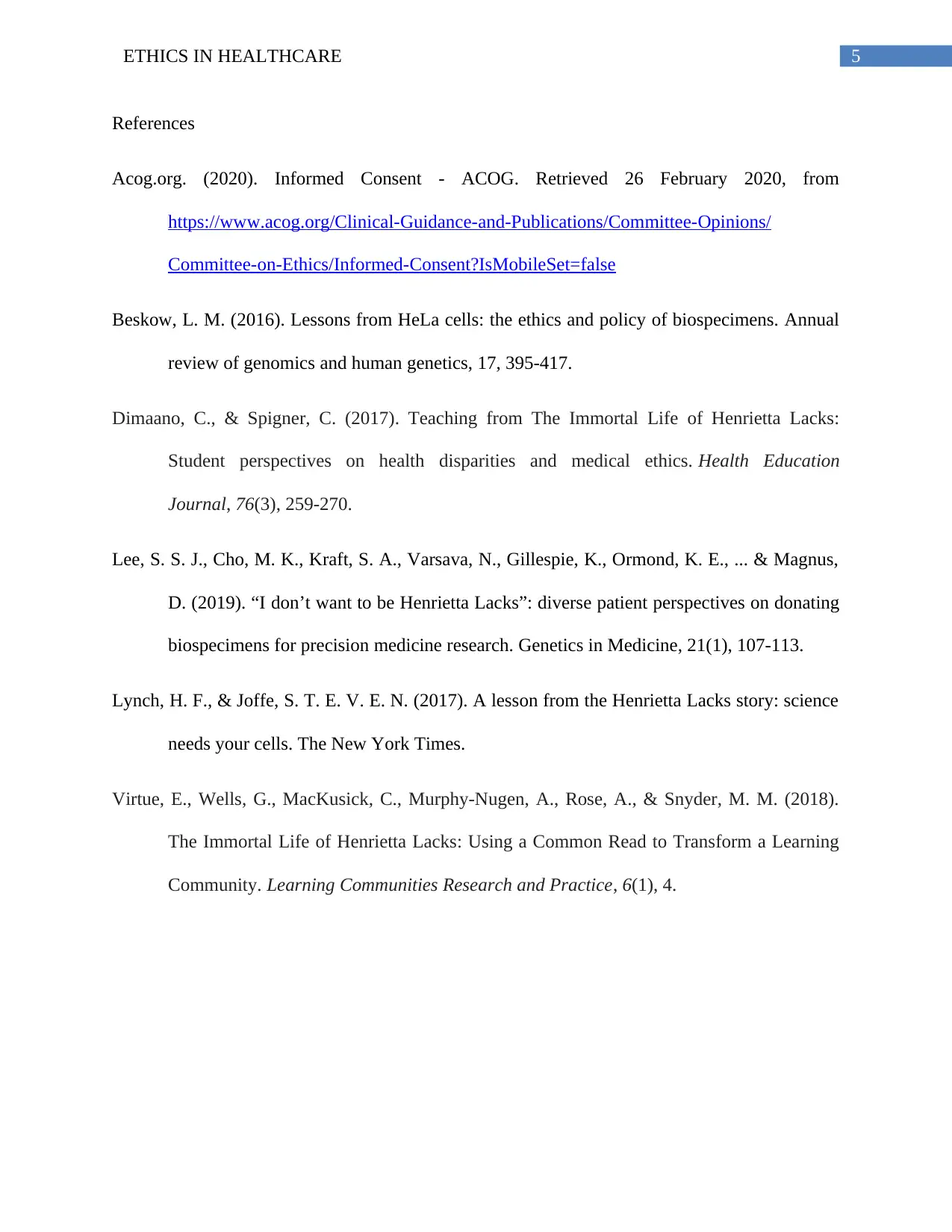
5ETHICS IN HEALTHCARE
References
Acog.org. (2020). Informed Consent - ACOG. Retrieved 26 February 2020, from
https://www.acog.org/Clinical-Guidance-and-Publications/Committee-Opinions/
Committee-on-Ethics/Informed-Consent?IsMobileSet=false
Beskow, L. M. (2016). Lessons from HeLa cells: the ethics and policy of biospecimens. Annual
review of genomics and human genetics, 17, 395-417.
Dimaano, C., & Spigner, C. (2017). Teaching from The Immortal Life of Henrietta Lacks:
Student perspectives on health disparities and medical ethics. Health Education
Journal, 76(3), 259-270.
Lee, S. S. J., Cho, M. K., Kraft, S. A., Varsava, N., Gillespie, K., Ormond, K. E., ... & Magnus,
D. (2019). “I don’t want to be Henrietta Lacks”: diverse patient perspectives on donating
biospecimens for precision medicine research. Genetics in Medicine, 21(1), 107-113.
Lynch, H. F., & Joffe, S. T. E. V. E. N. (2017). A lesson from the Henrietta Lacks story: science
needs your cells. The New York Times.
Virtue, E., Wells, G., MacKusick, C., Murphy-Nugen, A., Rose, A., & Snyder, M. M. (2018).
The Immortal Life of Henrietta Lacks: Using a Common Read to Transform a Learning
Community. Learning Communities Research and Practice, 6(1), 4.
References
Acog.org. (2020). Informed Consent - ACOG. Retrieved 26 February 2020, from
https://www.acog.org/Clinical-Guidance-and-Publications/Committee-Opinions/
Committee-on-Ethics/Informed-Consent?IsMobileSet=false
Beskow, L. M. (2016). Lessons from HeLa cells: the ethics and policy of biospecimens. Annual
review of genomics and human genetics, 17, 395-417.
Dimaano, C., & Spigner, C. (2017). Teaching from The Immortal Life of Henrietta Lacks:
Student perspectives on health disparities and medical ethics. Health Education
Journal, 76(3), 259-270.
Lee, S. S. J., Cho, M. K., Kraft, S. A., Varsava, N., Gillespie, K., Ormond, K. E., ... & Magnus,
D. (2019). “I don’t want to be Henrietta Lacks”: diverse patient perspectives on donating
biospecimens for precision medicine research. Genetics in Medicine, 21(1), 107-113.
Lynch, H. F., & Joffe, S. T. E. V. E. N. (2017). A lesson from the Henrietta Lacks story: science
needs your cells. The New York Times.
Virtue, E., Wells, G., MacKusick, C., Murphy-Nugen, A., Rose, A., & Snyder, M. M. (2018).
The Immortal Life of Henrietta Lacks: Using a Common Read to Transform a Learning
Community. Learning Communities Research and Practice, 6(1), 4.
⊘ This is a preview!⊘
Do you want full access?
Subscribe today to unlock all pages.

Trusted by 1+ million students worldwide
1 out of 6
Related Documents
Your All-in-One AI-Powered Toolkit for Academic Success.
+13062052269
info@desklib.com
Available 24*7 on WhatsApp / Email
![[object Object]](/_next/static/media/star-bottom.7253800d.svg)
Unlock your academic potential
Copyright © 2020–2025 A2Z Services. All Rights Reserved. Developed and managed by ZUCOL.





